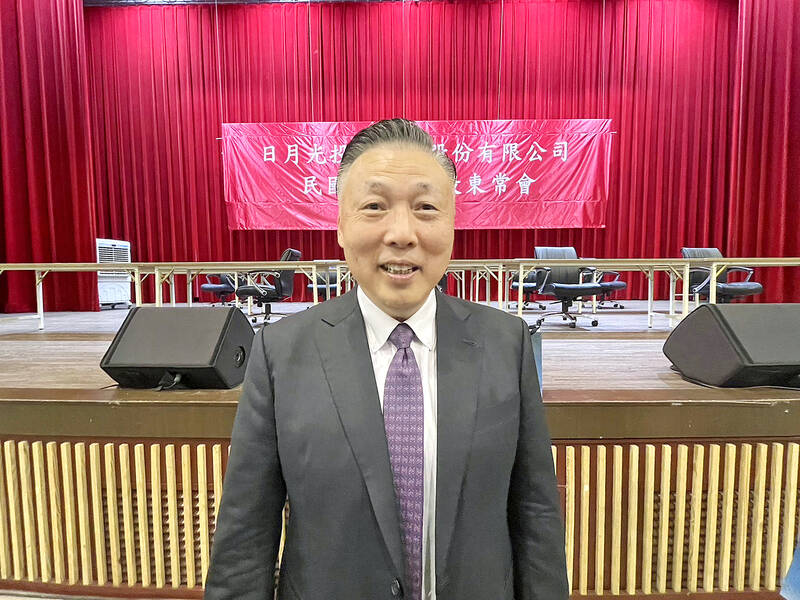ASE Technology Holding Co (ASE, 日月光投控), the world’s biggest chip packaging and testing service provider, yesterday said it plans to launch a new high-end chip testing fab in the US next month to better serve its key customers based in North America, particularly California-based artificial intelligence (AI) customers.
The new US testing facility would be operated by the firm’s subsidiary ISE Labs Inc, it said.
ASE’s major customers, and high-ranking US officials and representatives from American Institute in Taiwan are to attend the fab’s opening ceremony on July 12, it said.

Photo: CNA
ISE Labs last year acquired a 5,942m2 facility in San Jose, California, for US$24 million to expand capacity, ASE said in a filing with the Taiwan Stock Exchange.
ISE Labs’ new testing fab would be part of ASE’s broader global expansion plans, ASE said.
ASE is scouting potential sites to deploy advanced chip packaging capacity in the US, Japan and Mexico, in response to customers’ growing demand to strengthen supply chain resilience amid mounting geopolitical risks, ASE chief operating officer Tien Wu (吳田玉) told reporters on the sideline of the company’s shareholders’ meeting.
“With this substantial US investment, we intend to demonstrate our goal to create a global deployment. Our purpose is to take good care of our North American clients, very important clients, especially our AI clients based in California,” Wu said.
Additionally, ASE has applied to the US government to create a free trade zone in the region, allowing customers from different countries to ship advanced wafers there for testing and simplifying tedious export procedures, Wu said.
In Mexico, ASE has acquired a plot of land to build an automative electronics and power units supply chain there, with its subsidiary Universal Scientific Industrial (Shanghai) Co (環旭電子), Wu said, targeting North America’s automative electronics used in autonomous vehicles and next-generation robots.
In Japan, ASE is looking for a location to build a larger-scale advanced packing facility than its operation in Yamagata, Wu said.
In Malaysia, ASE is looking to expand its capacity in Penang, where the company operates a major manufacturing site, to cope with increasing demand from a European automative chipmaker, he said.
The companies have inked a long-term supply agreement, he added.
ASE also raised its forecast for the revenue growth from advanced packaging technology, or chip-on-wafer-on-substrate (CoWoS), this year, due to demand for AI chips.
“Earlier this year, we expected to have an additional US$250 million revenue increase from the CoWoS business. Now it looks like we will exceed that figure. AI demand will remain solid in the second half and through next year,” Wu said.
ASE is collaborating with Taiwan Semiconductor Manufacturing Co (台積電) to increase supply of CoWoS packaging capacity to catch up with strong AI chip demand, ASE said.

SETBACK: Apple’s India iPhone push has been disrupted after Foxconn recalled hundreds of Chinese engineers, amid Beijing’s attempts to curb tech transfers Apple Inc assembly partner Hon Hai Precision Industry Co (鴻海精密), also known internationally as Foxconn Technology Group (富士康科技集團), has recalled about 300 Chinese engineers from a factory in India, the latest setback for the iPhone maker’s push to rapidly expand in the country. The extraction of Chinese workers from the factory of Yuzhan Technology (India) Private Ltd, a Hon Hai component unit, in southern Tamil Nadu state, is the second such move in a few months. The company has started flying in Taiwanese engineers to replace staff leaving, people familiar with the matter said, asking not to be named, as the

The prices of gasoline and diesel at domestic fuel stations are to rise NT$0.1 and NT$0.4 per liter this week respectively, after international crude oil prices rose last week, CPC Corp, Taiwan (台灣中油) and Formosa Petrochemical Corp (台塑石化) announced yesterday. Effective today, gasoline prices at CPC and Formosa stations are to rise to NT$27.3, NT$28.8 and NT$30.8 per liter for 92, 95 and 98-octane unleaded gasoline respectively, the companies said in separate statements. The price of premium diesel is to rise to NT$26.2 per liter at CPC stations and NT$26 at Formosa pumps, they said. The announcements came after international crude oil prices

SinoPac Financial Holdings Co (永豐金控) is weighing whether to add a life insurance business to its portfolio, but would tread cautiously after completing three acquisitions in quick succession, president Stanley Chu (朱士廷) said yesterday. “We are carefully considering whether life insurance should play a role in SinoPac’s business map,” Chu told reporters ahead of an earnings conference. “Our priority is to ensure the success of the deals we have already made, even though we are tracking some possible targets.” Local media have reported that Mercuries Life Insurance Co (三商美邦人壽), which is seeking buyers amid financial strains, has invited three financial

CAUTION: Right now, artificial intelligence runs on faith, not productivity and eventually, the risk of a bubble will emerge,’ TIER economist Gordon Sun said Taiwanese manufacturers turned more optimistic last month, ending a five-month streak of declining sentiment as concerns over US tariffs, currency volatility and China’s overcapacity began to ease, the Taiwan Institute of Economic Research (TIER) said yesterday. The manufacturing business confidence index rose 1.17 points from June to 86.8, its first rebound since February. TIER economist Gordon Sun (孫明德) attributed the uptick to fading trade uncertainties, a steadier New Taiwan dollar and reduced competitive pressure from Chinese producers. Taiwan’s semiconductor industry is unlikely to face significant damage from Washington’s ongoing probe into semiconductors, given the US’ reliance on Taiwanese chips to power artificial